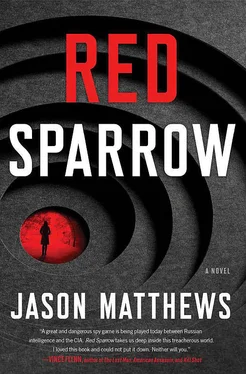Sauté onions and garlic in olive oil. Add peeled chopped tomatoes, beef stock, and parsley, and boil until thick. Add cooked gigantes beans, mix well, and bake in medium-low oven until beans are soft and top is crispy, even lightly burned. Serve at room temperature.
Vanya Egorov wasin his office working late. The sky had gone from pink to purple to black, but all Egorov noticed was the flat-screen monitor showing endless stories from Greek television, Eurovision, the BBC, Sky, the American CNN, about the incident in Athens.
The Athens rezidentura had confirmed that the dead man was Sergey Matorin. Vanya felt his bowels flip when the rezident informed him that the Greeks—inexplicably—had already cremated the body, making a forensic autopsy impossible. Inexplicably, my ass, thought Vanya. The CIA owned the Greeks, had for years.
Not important, not now. Vanya knew someone else had authorized the wet work in Athens, had dispatched the pie-eyed psychopath to Greece. Not the Director, not his counterparts at the FSB. Not even the dwarfish Zyuganov. Only one possible name. As if sentient, the VCh phone trilled, making Egorov jump in his seat. The familiar voice came through brutally, rasping and ragged, but evilly calm.
“The operation in Athens was a disgrace,” said Putin. Is he in his stocking feet? thought Egorov. Shirtless?
“Yes, Mr. President,” said Egorov dully. There was no point in stating that he had not authorized it. Putin knew.
“I expressly specified that there be no Special Tasks.”
“Yes, Mr. President, I shall investigate—”
“Leave it,” said the voice. “I looked for more successes from you. The loss of the senator is colossal. The mole in your Service remains active. What are you doing to track this traitor down?” If you had resisted your monstrous urges, thought Egorov, we might have him in the bottle.
“As you know, Mr. President, I assigned a skillful officer to exploit the American handler. I was hoping for important information—”
“Yes, your niece. Where is she now?” Here it comes, the worst.
“She is unaccounted-for, in Greece.” Silence at the other end.
“What is the probability that she is dead?” asked Putin. Don’t sound so hopeful, thought Vanya.
“We are waiting for word,” said Egorov. Another long silence. Dominika was a bigger threat to the president, more than the espionage flap in Washington, bigger than a mole in the Service.
“She needs to come home,” said Putin. “See that she is safe.” Which meant, Ensure that she will never—ever—talk about the Ustinov intriga, the action, whatever it takes—whatever. The line went dead.
Dominika was missing; if not dead, then presumably in hiding. How she could hide, alone, in the Greek capital, was a mystery. His little Sparrow must be resourceful, he thought. There was news footage of a cordon of gray-and-white Greek police vans around the Russian Embassy in Psychiko. The Greeks had considered the possibility that a Russian fugitive would seek refuge in the chancery.
News accounts included reports of another man, they didn’t have Nash’s name. Had Dominika gotten anything out of him? Had the CIA killed Dominika? Captured her? If she was alive, he had to get her back. Spasenie, salvation, would be possible.
The telephone on his desk purred—it was the outside line, and therefore nothing important. “What is it?” he snapped. His aide Dimitri was on the line.
“An outside call patched in from the duty officer, sir,” he said.
“What is this nonsense?” Egorov raved.
“A call from overseas, sir,” said Dimitri. “They traced it to Greece.”
Egorov felt the skin on his head contract. “Put it through,” he said.
Dominika’s voice came in over the line. “Uncle? Uncle? Can you hear me?”
“Yes, hello, my child. Where are you?”
“I cannot talk long. It is very difficult here.” She sounded tired, but not panicked.
“Can you tell me where you are? I will send someone to you.”
“I’d welcome the help. I’m a little tired.”
“I will send someone for you. Where can we meet you?”
“Uncle, I have to tell you that my friend, the young one, began talking. I made good progress. Like you hoped I would. But your man, that d’javol, almost killed us both.”
“What happened?” asked Egorov.
“They fought. My young friend fled, I do not know where he is.”
“The young American bested a Spetsnaz-trained fighter?” Egorov wanted to know.
“No, Uncle. I killed him . He would have killed me.” There was silence on the other end of the line.
Hristos, Christ, Egorov thought, what a demon. How could she possibly have liquidated Matorin? His hand on the receiver was wet. “I see. What did your young friend tell you?”
“Yes. Something strange. He bragged that the Americans had just caught one of your spies, a woman; he said she was important. I told him I did not believe him.” You can believe it, all right, thought Egorov.
“He told me you had tried to mislead the Americans, telling them the spy was sick, unable to work.”
Egorov was about to scream into the receiver, to tell the little idiot to get on with it. He could feel his own pulse through the earpiece. “That’s most interesting. Did he say anything more?”
“Just that the spy did not really have eye surgery, it was a false trail and the Americans saw through it. My friend seemed quite proud that they had caught the spy,” said Dominika.
And now they will be less pleased when they lose their own spy, thought Egorov. Korchnoi.
“Nothing more?” Korchnoi.
“Nothing, Uncle. Our conversation might have continued if we had not been interrupted.”
“Yes, of course. Now we must get off this line. Where are you? I will send someone for you. You must stay out of sight.”
“I have been staying with a man I met, a stranger, in his apartment. He promised not to turn me in if I was nice to him. That’s what you trained me to do, isn’t it?”
Egorov missed the irony in her voice. “Can you stay there for another day? Are you calling from his phone?”
“I think I can stay. But I have to go out to call. I abandoned my phone in that hotel. The man has no phone, only a mobile, I would not like to use it to call you. There is a kiosk across the street. I’m calling from there, with a phone card.” She gave him the name of the street and the building number in the working-class neighborhood of Patissia, north of Omonia Square.
“Be at the kiosk tomorrow exactly at noon,” said Egorov. “A car will come for you. The driver will mention my name. We’ll get you back home. In the meantime, stay off the street.” He broke the connection.
If they could recover her, Egorov thought, he would be safe. He would cover her in medals if they bagged Korchnoi. First, a telegram to that durak in Athens to see if that jackass could manage to pick up an officer under hot pursuit, then order twenty-four-hour coverage on Korchnoi. No alarms, no alerts, no exfils by the Americans.
Even as he steeled his circus strongman’s body for the wait, he began thinking about his old colleague who had betrayed him and helped the Americans find SWAN. “Get me Zyuganov,” he called to Dimitri.
=====
The Athens rezident ’s cable arrived the next day in Yasenevo at close of business. It described the scene as two SVR officers entered the Patissia neighborhood to approach the kiosk and collect Dominika. They reported that no fewer than six Greek police cars and twenty police officers in white helmets and flak jackets were milling around the kiosk. It was chaos, the SVR men could not get close, but they saw two female police officers lift a handcuffed woman up the rear steps of a police van. They described the prisoner as “dark-haired and thin,” nothing positive but likely Dominika. She was in their hands. Not two minutes after the arrival of the cable on his desk, the VCh phone on the credenza behind Egorov’s desk began trilling with a sound unknown in nature.
Читать дальше












